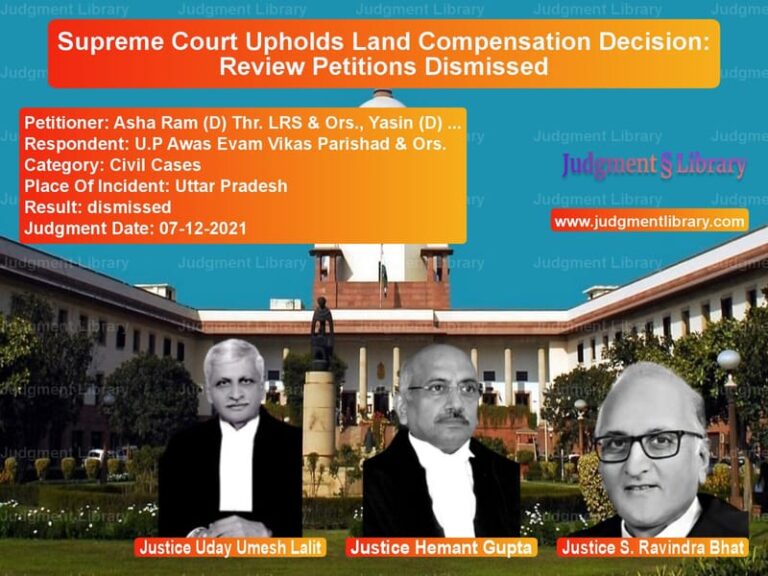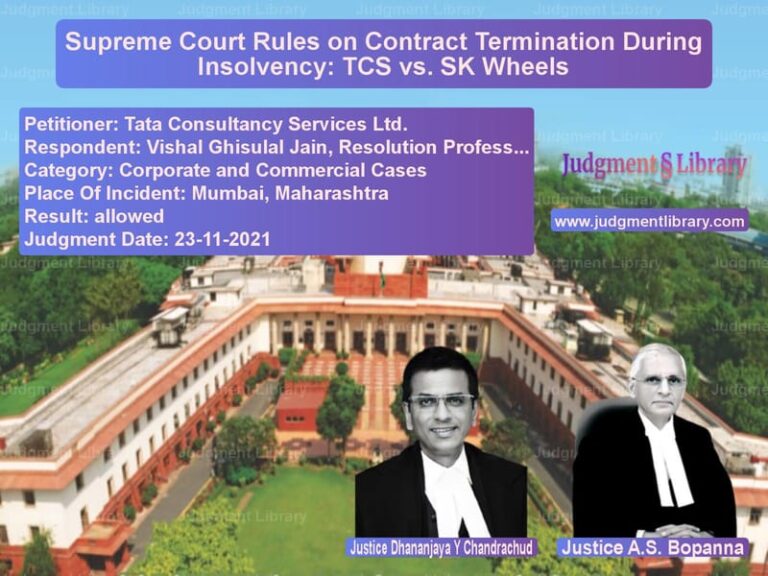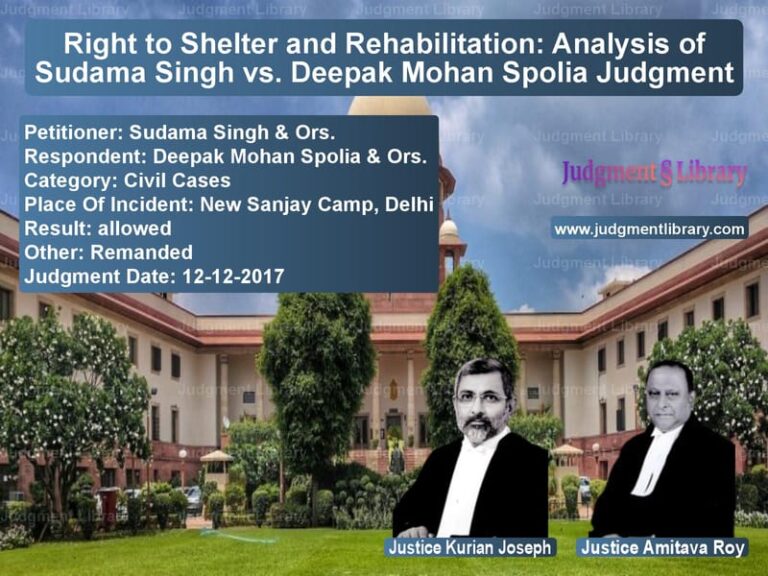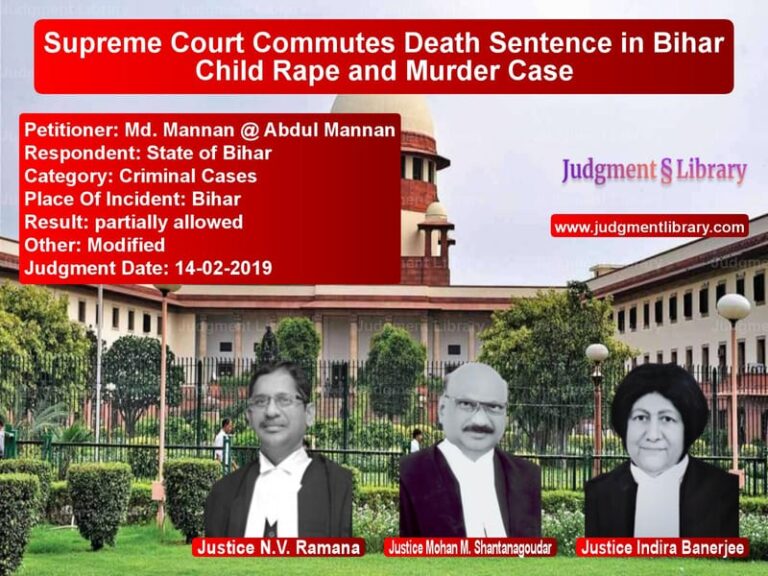Land Dispute in Maharashtra: Supreme Court Settles Case Through Compromise
The case of Digamber & Anr. vs. Kachru & Ors. is a significant Supreme Court judgment concerning a long-standing land dispute in Maharashtra. The case revolved around the ownership and possession of agricultural land, which had been under mortgage since 1942. The Supreme Court facilitated an amicable settlement between the parties and directed the division of land accordingly.
Background of the Case
The dispute originated in 1941 when the suit land was mortgaged by its original owner, Kisan Punde, to Vasudeo for Rs. 200. In 1942, Vasudeo further mortgaged the land to Chandu Narsingh Pardeshi, the father of the appellants. The possession of the land was transferred to the mortgagees. Over time, various transactions took place, including the alienation of five acres of land by Chandu to third parties.
In 1984, the legal heirs of Kisan Punde, including Vithal, Tukaram, Kachru, and Madan, initiated legal proceedings before the Additional Collector, Aurangabad, seeking termination of the mortgage and restoration of possession. The petition was filed under Section 10 of the Prevention of Agricultural Lands Alienation Act, 1939, read with Section 103 of the Hyderabad Tenancy and Agricultural Lands Act, 1950. The Additional Collector ruled in favor of the legal heirs of Kisan Punde.
Key Legal Issues
The Supreme Court had to address the following key issues:
- Whether the mortgagee (the appellants) could claim ownership under Section 5 of the Hyderabad Tenancy and Agricultural Lands Act, 1950.
- Whether the possession of the land by the mortgagees could be legally terminated.
- Whether the various transactions, including alienation of portions of the land, were legally valid.
- Whether an amicable settlement could be reached to resolve the dispute.
Arguments by the Appellants (Digamber & Anr.)
The appellants, represented by Digamber & Anr., contended:
- That they had been in possession of the land since 1942 and should be considered as “deemed tenants” under Section 5 of the Hyderabad Tenancy and Agricultural Lands Act, 1950.
- That their possession was legally valid and had continued for decades without challenge.
- That the Additional Collector’s order in favor of the respondents was based on an incorrect interpretation of the law.
Arguments by the Respondents (Legal Heirs of Kisan Punde)
The respondents, represented by Kachru and others, argued:
- The mortgage was never intended to be permanent, and the land should be returned to its rightful owners.
- The appellants could not claim ownership under the tenancy law as they were mortgagees, not tenants.
- The transactions made by the appellants in transferring parts of the land were illegal.
Supreme Court’s Observations and Ruling
The Supreme Court bench, comprising R. Banumathi and A.S. Bopanna, facilitated an amicable settlement between the parties.
1. Exclusion of Mortgagees from Deemed Tenancy
The Court upheld the principle that mortgagees in possession cannot claim deemed tenancy under the Hyderabad Tenancy and Agricultural Lands Act, 1950.
“Section 5 of the Hyderabad Tenancy and Agricultural Lands Act, 1950, excludes mortgagees in possession from being termed as ‘deemed tenants.’”
2. Validity of the Collector’s Order
The Supreme Court upheld the Additional Collector’s ruling that the legal heirs of Kisan Punde had a valid claim for the return of the land.
“The proceedings initiated by the sons of Kisan Punde were maintainable, and the Collector’s order directing restoration of possession was legally sound.”
3. Settlement and Division of Land
The Court noted that all concerned parties had reached an amicable settlement. As per the terms of the settlement:
- The total land area under dispute was 29 acres and 4 gunthas.
- The land was divided among various claimants as per a mutually agreed Compromise Memo.
- A sketch and division plan (Annexure-A5) was submitted to the Court detailing how the land was to be distributed.
Final Judgment
The Supreme Court disposed of the appeal in terms of the Compromise Memo:
“The appeal is disposed of in terms of the Memo of Compromise. The terms of the Compromise (Annexure-A3) and the maps/sketches (Annexure-A5) showing the division of the properties amongst the parties shall form part of this judgment.”
Implications of the Judgment
This ruling has significant implications for land disputes:
- Exclusion of Mortgagees from Deemed Tenancy: Mortgagees cannot claim permanent rights over land under tenancy laws.
- Encouragement of Amicable Settlements: The Court encouraged parties to negotiate and settle disputes rather than prolong litigation.
- Legal Recognition of Family Settlements: The ruling affirms that legally documented settlements are binding and enforceable.
Conclusion
The Supreme Court’s decision in Digamber & Anr. vs. Kachru & Ors. highlights the importance of amicable dispute resolution in long-standing land conflicts. The Court ensured a fair distribution of land while upholding tenancy laws, reinforcing the principle that mortgagees cannot claim ownership rights beyond their contractual obligations.
Petitioner Name: Digamber & Anr..Respondent Name: Kachru & Ors..Judgment By: Justice R. Banumathi, Justice A.S. Bopanna.Place Of Incident: Maharashtra.Judgment Date: 02-12-2019.
Don’t miss out on the full details! Download the complete judgment in PDF format below and gain valuable insights instantly!
Download Judgment: Digamber & Anr. vs Kachru & Ors. Supreme Court of India Judgment Dated 02-12-2019.pdf
Direct Downlaod Judgment: Direct downlaod this Judgment
See all petitions in Property Disputes
See all petitions in Landlord-Tenant Disputes
See all petitions in Succession and Wills
See all petitions in Judgment by R. Banumathi
See all petitions in Judgment by A. S. Bopanna
See all petitions in settled
See all petitions in settled
See all petitions in supreme court of India judgments December 2019
See all petitions in 2019 judgments
See all posts in Civil Cases Category
See all allowed petitions in Civil Cases Category
See all Dismissed petitions in Civil Cases Category
See all partially allowed petitions in Civil Cases Category







